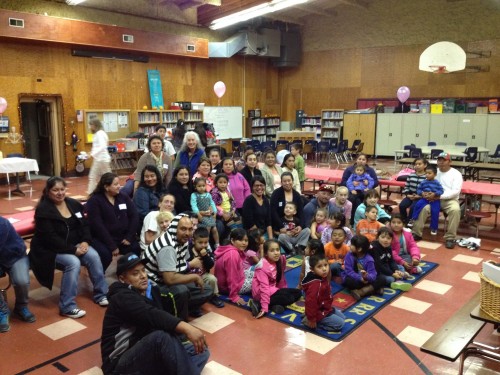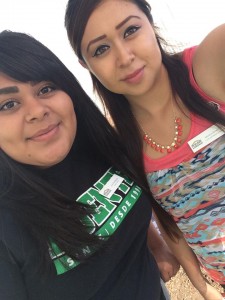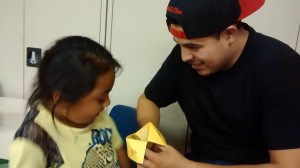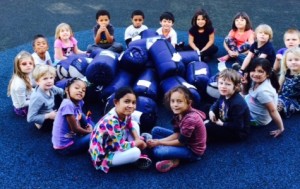Any educator can tell you that a young person’s love of learning begins at home. The year 2014 was a landmark one for Puente and the South Coast community as we tackled chronic problems in local students’ early reading and language skills with several exciting new programs, many of which are designed to engage local parents as much as they do their young children.
In 2014, Puente received a grant from the Heising-Simons Foundation to fund its new Family Engagement Impact Initiative, which Puente developed in conjunction with the La Honda-Pescadero Unified School District. The two-year, nearly $400,000 grant already has helped Puente launch several efforts designed to address students’ struggles by promoting early literacy K-8 and bridging the learning gap between home and school.
These bold steps include:
• Expanding the ‘Raising a Reader’ program to include early literacy training and practice for parents
• Introducing Abriendo Puertas (Opening Doors), a ten-part curriculum that teaches parents how to support their children’s growth and education at every age
• Providing a series of workshops on child development and early learning for in-home child care providers, with support from the San Mateo County Office of Education and WestEd’s Program on Infant/Toddler Care
• Hiring an Early Literacy Specialist to oversee new programs and workshops
• Purchasing books and other materials essential to these initiatives
Significant Partnerships
Puente’s recent efforts around education stem from a close working relationship between Amy Wooliever, Superintendent of the La Honda-Pescadero Unified School District, and Puente Academic Director Suzanne Abel. Their partnership has already demonstrated considerable success this year by bringing bilingual college students into Pescadero Elementary classrooms as teacher’s aides. Additional college students, all part of the Classroom Connection program at Merrill College, University of California, Santa Cruz, are also working one-on-one as tutor/mentors with Pescadero Middle School students who need a boost.
The La Honda-Pescadero School District is one of 11 public school districts in San Mateo County where 42% students are not reading at grade level by the third grade. “Not coincidentally, those are the same 11 communities where the majority of children reside who are English learners, or children of color, or poor children,” says Jean-Marie Houston, Director of Early Learning Support Services for the San Mateo County Office of Education. “Those are the kids who we say have the ‘achievement gap.’ But we know it begins as a readiness gap.”
The South Coast fits that description to a tee. Wooliever sees the ‘readiness gap’ emerge as early as preschool or kindergarten, and it gets compounded from that point on.
“Our students have gaps in language when they come to first grade. Not just English – I’m talking about overall language,” she says.
Learning to read
What’s happening is that some children aren’t spending enough time around books, whether that’s because their parents struggle to read themselves, can’t afford books, or are working too many hours to spend quality time reading with their sons and daughters. As a result, children come to school unprepared for the experience of handling a book, and haven’t known the delight and discovery that come with books.
Puente and LHPUSD are addressing the problem head-on with a series of ‘Raising a Reader Family Nights,’ instructional workshops for parents to practice reading to their children.
“Even if you don’t know how to read and write, you can look at the pictures and make up a story about the pictures, or sing about the pictures,” says Arlae Alston, Puente’s new Early Literacy Specialist.
Just teaching a child how to handle a book, and setting a routine for parent-child bonding around books, is enough to put children on a path toward wanting to explore books, says Alston.
Kickoff training in October for parents of children in preschool and kindergarten was a big success. Four more Family Night workshops will be held in early 2015 for the same families. Additionally, the “Abriendo Puertas” curriculum will initially target families with the youngest children (0-3), in order to engage families even earlier in shared experiences around books. Alston says parents will make a book for their children based on a story or a memory they want to share. That’s done for a very specific reason. “Think how empowering and important it is for a child to see that this story from your mom was written in a book. Every one of these programs sends the message that parents are the first teachers of their children,” she adds.
‘Raising a Reader’ sends children home with a colorful book bag that is filled with new books each week – picture books, reading books, numeracy books. So far the program serves local children in preschool and kindergarten, but plans are underway to extend the program to the youngest children in our community.
On November 17-19, 2014, a cohort of 15 Puente and LHPUSD staff, parents, and partners from Peninsula Family Service attended intensive training in the parent engagement program, Abriendo Puertas (Opening Doors), a national program that capitalizes on the cultural strengths of Latino parenting. The institute trained the trainers, who will then offer the series to parents in the community using a common curriculum. Raising a Reader and Abriendo Puertas will work synergistically to build a culture of early reading with children.
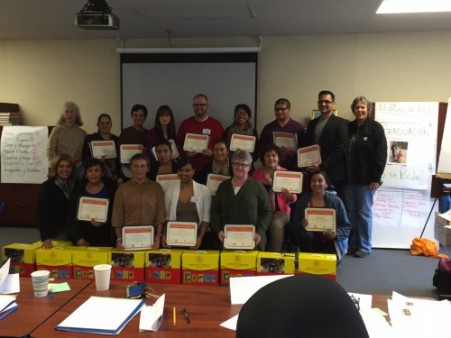
Abriendo Puertas training team
Reading to learn
Third grade is an essential moment of transition in a child’s education, according to Houston. A student who has been learning to read will start reading to learn. At that point, “If you don’t have those basic tools in place, you start to lose ground and you get further and further behind,” she says.
In fact, students who are not reading proficiently by the third grade are 13 times less likely to graduate on time, as compared with those who are.
There is ample evidence that a good-quality, full-day preschool program can prepare a child for academic success.
That data was enough to convince the La Honda-Pescadero School District to approve a full-day preschool program for South Coast children for the first time this year – even though the school district has no sustainable source of funding for the effort. “It was just too important,” says Wooliever.
“Our board was open to taking a leap of faith, knowing that extending the school day was going to be better for students educationally, and more manageable for parents.”
In spite of the fact that San Mateo County is one of the most affluent counties in the nation, only half of children who reside here can afford preschool, according to the county Office of Education. As a result, 3,300 children who could be attending preschool in the County are missing out, starting out behind.
There is a good reason to believe that will change very soon. The Silicon Valley Community Foundation was recently selected as one of seven national recipients of a $7.5 million grant from the Corporation for National and Community Service, a federal agency. That money will go to The Big Lift, an innovative San Mateo County campaign to advance early childhood learning. The San Mateo County Board of Supervisors has set aside $10 million in Measure A funding to match the federal grant and is raising additional dollars from the business and foundation sectors.
Preschool funding is one of The Big Lift’s four areas of focus, and Houston says the La Honda-Pescadero Unified School District is on a list of priority districts.
“We’re going to move the dial for our children,” she says.

